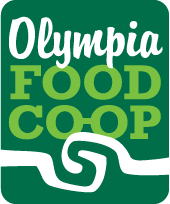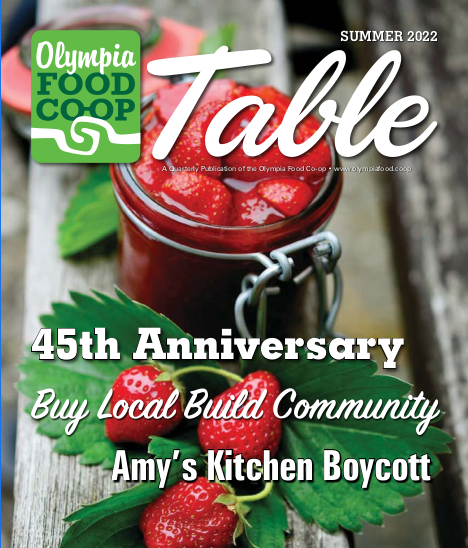45 Years of Co-op Local
A compilation of local musings by writers over the years, including Erin Majors, Grace Cox, Jennifer Shafer, Maureen Tobin, Robyn Wagoner and Tina Shubert
Anniversary years are a great time to reflect on all the things an organization might want to celebrate, and to consider ways to evolve and improve. As we enter our 45th year as a cooperative natural foods store, one of our cornerstone programs is widely considered an ongoing community accomplishment that just keeps getting better—our Local Farms, Food and Products program.
You can find the word local across a variety of retail store these days. But, what does it mean when local is advertised? This is an interesting question because it can mean wildly different things from store to store. It could mean regionally sourced, as in it came from within your neighboring states. It could refer to a small farm or business, or, it could mean multi-million operations, which sell within their home state and beyond.
At our Co-op, local has been a foundational value from day one. It is the bedrock to so many of our choices in operations, because as both workers and shoppers, our choices can make or break meeting our organizational mission and goals.
…to provide wholesome foods and other goods and services, accessible to all, through a locally oriented, collectively managed, not-for-profit cooperative organization that relies on consensus decision making…
We believe our community supports these values and has shown us this throughout the ups and downs of our economic realities. It is an inspired, unwavering understanding that people matter; that this planet matters; that our food matters. Most of all, it is the knowledge that when you come through the Co-op’s doors, you won’t have to wonder exactly what definition of local buying is being used, because Co-op Local is clear. It means that we work directly with the food producer, building longstanding relationships with people and businesses in our areas that love what they do and the food they make.
Across our departments, from Chill to Wellness, we value these relationships and prioritize our time and resources to support them. Many of our department managers over the years have helped small businesses get into retail sales and discover best methods to market their wares. We currently purchase directly from more than 125 local or regional farms and producers, with the list getting longer all the time.
Co-op Local is Direct, Fresh and Strong Community. Every time.
Tina says it best, “When I think about it, it gets to the root of why I’ve been a member of the Co-op for so many years. As a shopper, I can make my selections with confidence, knowing exactly where my delicious food has come from. And as a Staff member, I can see the impact of our Co-op Local every time I receive a delivery in the warehouse and sign an invoice from a local producer. Knowing that each of those dollars will circulate within our communities for somewhere around a hundred times before it leaves our local economy, leaves me with a great sense of purpose and pride. I see this phenomenon every day and for me, that is the power of Co-op Local.”
Local Farms Program
In our Produce Department specifically, “Co-op Local” means the food is grown on farms ranging from ½ an acre to 50 acres in size and travels from Thurston, Mason, Lewis, Pierce, and Grey’s Harbor counties. This arrangement ensures the freshest possible food on our plates, while saving resources, protecting the environment, strengthening local economies, and building community networks.
The Local Farms Program also creates regional direct purchasing agreements with farms further away, often supplying us with the stone fruit and apple bounty of Eastern Washington, and who don’t utilize a distributor. An example is Brownfield Orchard who has faithfully delivered high quality, small farm fruits for more than two decades throughout the growing season. Fun fact, Brownfield was the organic grower in Washington to gain organic certification!
Our Local Farms Program is an example of successful cooperative negotiations between suppliers and buyers. Our area is so lucky to have literally dozens of talented local farmers who can grow truly amazing amounts of produce. The program encourages local farmers to work together, rather than competing with one another. For example, when a farm who has been growing a crop for the Co-op runs out, they may alert another farmer who they know is growing the same item.
Our produce managers over the years have worked to streamline the process of purchasing produce from local farms, to improve year-round consistency and diversity of produce, and to satisfy the farmers’ desires for a dependable living wage. We meet with our farmers annually and agree upon an average market price prior to each season. This allows farmers to apportion their planting time and seed money more effectively, helping our shoppers and the whole community have plenty of fresh fruits and vegetables year-round, and featured in our deli and salad bar preparations.
By decreasing our profit margin, the Co-op can offer our local farmers good prices for their crops without substantially increasing the amount our shoppers pay. We can do this because we’re a not-for-profit enterprise, and making surplus money is not our guiding motivation.
At the Olympia Food Co-op we’re celebrating this last half of our 4th decade of bringing more healthy food to more people by supporting local farmers and producers who strive to use sustainable methods and ethical business practices.
Sidebar–We invite you to contribute to our anniversary celebration with your art, stories, photos, home movies, and memorabilia to be included in our anniversary event and archiving. Please contact us at outreach@olympiafood.coop with any type of art or content you’d like to contribute!

